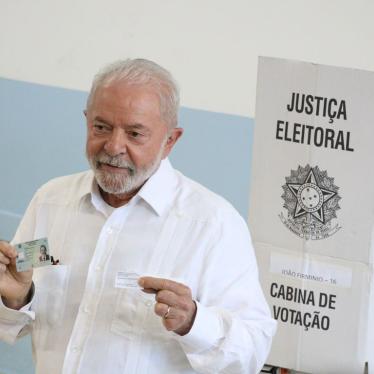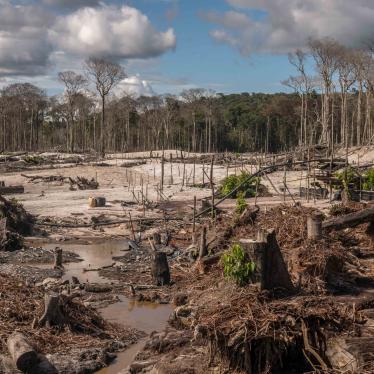“Brazil is back,” President-elect Inácio Lula da Silva said, in his speech at COP-27 in Egypt last month. Brazil is ready to rejoin international efforts, he promised, and take strong measures to tackle climate change.
President Jair Bolsonaro’s dismantling of Amazon rainforest protections and mismanagement of the Covid-19 pandemic has done profound damage to Brazil’s international image—and, more important, to human rights. President-elect Lula needs to hit the global reset button fast.
Brazil’s constitution requires placing human rights at the center of foreign policy. This means defending rights consistently, regardless of the ideology of any particular government.
President Bolsonaro lambasted Venezuela and Cuba but cheered other leaders with clear authoritarian tendencies and flagrant human rights abuses, from Russia’s Vladimir Putin to Hungary’s Viktor Orban, to the US’s Donald Trump.
During his 2003-2010 presidency, then-President Lula was often criticized for letting ideological affiliations get in the way of addressing grave human rights abuses. He kept quiet, for instance, as Hugo Chávez gradually undermined democracy in Venezuela.
Lula´s third term should be different. He should act and speak to protect democracy and rights regardless of ideological affinity.
Lula will have plenty of opportunities for a consistent defense of human rights, starting with the region. In El Salvador, President Nayib Bukele has weakened institutions responsible for safeguarding the rule of law and adopted security policies that resulted in widespread human rights violations, including enforced disappearances, torture, and thousands of arbitrary arrests. In Venezuela, Nicaragua, and Cuba, the authorities systematically imprison protesters and political rivals, having snuffed out judicial independence and civil society participation.
Other governments in the region are taking the even-handed approach the Lula administration should adopt. Chilean President Gabriel Boric has repeatedly condemned left-wing double standards on human rights in Latin America. Officials worldwide have praised him for leading a feminist and environmentalist foreign policy. Brazil would do well to follow him in both, by criticizing human rights violations wherever they occur, promoting women to Foreign Ministry and other leadership posts, and ratifying the Escazu convention to protect forest defenders.
It is expected that the Lula administration will seek to reestablish diplomatic ties with Venezuela, but it should take measures to assure that such recognition comes with progress in human rights and free and fair elections.
President-elect Lula should align with other governments in the region in this respect, including Colombia, where President Gustavo Petro recently re-established diplomatic relations with Venezuela to press for concrete human rights commitments from Maduro. Lula should call for the release of political prisoners and progress in the Mexico negotiations between the Venezuelan government and the opposition.
Another tricky dance for President-elect Lula—considering that China is Brazil’s most important trading partner—will be to condemn that country’s crimes against humanity against Uyghurs and other Turkic Muslims, and press for international investigations.
And in the context of the Iranian authorities’ violent repression of protests that started in September, President-elect Lula will have an immediate opportunity to defend women and girls’ rights. As president in 2010, he offered asylum to Iranian women sentenced to death by stoning for adultery.
As Brazil prepares for its reemergence on the global stage, it should take unequivocal steps to undo a misguided foreign policy and abandon double standards on human rights. In the region, as in the world, the Lula administration needs to carry a basic human rights compass, as it works with local and international civil society groups to promote safety, justice, and equality for all.
*A version of this article has been published in Portuguese on Folha









